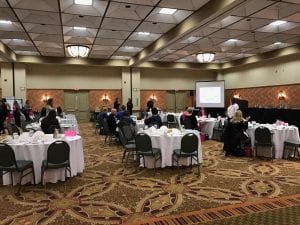Written by Account Executives Haley Dowell, Nikki Kesaris and Katie Thomson, and Account Supervisor Jenna Perlmutter, for the Susan G. Komen account team.
If you have ever attended a social event, you’ve probably noticed all the hard work and details that go into planning it. If you haven’t, hopefully by the end of this article you’ll appreciate the acute organization and time that goes into planning a successful event. This is a list of tips we believe are essential to planning a successful event. The Susan G. Komen team utilized these tips to plan and promote the Breast Cancer Forum event.
- Start planning early.
Planning an event takes time and precision. In most instances, it is not something that can happen over night. Develop checklists, develop a budget, begin on DIY crafts – get a head start on projects that you know will take some time, so when the event rolls around, you aren’t cramming.
- Prepare as much as you can the night before.
Event day can be hectic, but if you make a checklist and organize at least the night before, it can drastically reduce your stress come the day of. Instead of scrambling the day of the event to send out that one email you’ve been meaning to send, or calling that vendor that hasn’t called you back, confirm those details in advance. You’ll definitely thank yourself later.
- Triple check everything.
Chances are you are using outside vendors and/or relying on other people to help with your event. While delegation is always a great tool to use, remember to triple check times, orders and anything that could possibly be mixed up.
- Begin event day first thing in the morning.
Just because your event starts at 6 p.m. doesn’t mean you can’t start prepping at 8 a.m. Setting up early means more time to make sure everything is just how you want it. Stay calm, exude positive energy and rely on your teammates to help plan a successful event. Chances are people are there to support you!
- Expect the unexpected.
The unexpected is inevitable in event planning. Take a moment before event day to recognize different solutions if a problem arises. However, if something does go wrong the day of the event, take a deep breath. There is a large possibility that your guests don’t suspect a thing! And if they do, they will understand that everyone makes mistakes.
- Enjoy it.
Pause for a moment and take everything in. Enjoy all of your hard work and dedication.
Additional tips the Susan G. Komen team found helpful planning the Breast Cancer Forum event:
Our team helped publicize and promote the Breast Cancer Forum event for Susan G. Komen on October 22 in Eugene, Oregon. Komen is the largest and best-funded nonprofit in breast cancer research. We used the tips listed above to prepare for the event and ensure its success! Below we’ve included some additional tips we found helpful when planning an event:
- Publicity/Advertising.
Establish your audience and begin constructing effective messages. Susan G. Komen distributed a press release, flyers and postcards to reach University of Oregon students, staff and community members about the Breast Cancer Forum. It’s important to use a variety of methods because audiences do not always respond to everything the same way. A flyer may catch the attention of someone who is not into social media, but a social media post could reach someone who rarely checks their mail and may not see the postcard in time.
http://nonprofitpeople.monster.com/training/articles/94-tips-for-successful-event-planning
- Make it social.
Create a hashtag! Make it unique and specific to your event so when one searches it, only content about your event will come up. Once your attendees check-in, tell them to post about the event throughout the day using the hashtag. Have someone in charge of handling your social media accounts during the event and live tweet/post about it. SGK did not live tweet or post, but it did utilize social media to advertise the event.
http://www.buzzbinpadillacrt.com/ten-tips-for-successful-event-planning/
- Evaluate your event after.
At the SGK forum, it had event evaluation forms at the tables for its attendees to complete at the end. It asked questions such as, “What did you like, dislike and what you think could be improved for next time.” It also asked attendees to rate how they felt about the structure of the event, the topics discussed and the keynote speaker. This step is often missed; however, it is very important because in order to determine the success of your event, you must ask for participant feedback. It’s important to keep the evaluation form short and anonymous and encourage attendees to fill it out.
- Send out a post-event brief.
Once the event is over, you may think you can sit back and relax. However, while you can definitely do so, it wouldn’t hurt to send out a post-event brief to the attendees. While people are still thinking about the event, send them a recap highlighting your event’s success and thanking your attendees for coming. SGK posted one on Facebook with a collection of photos from the forum a few days after.

